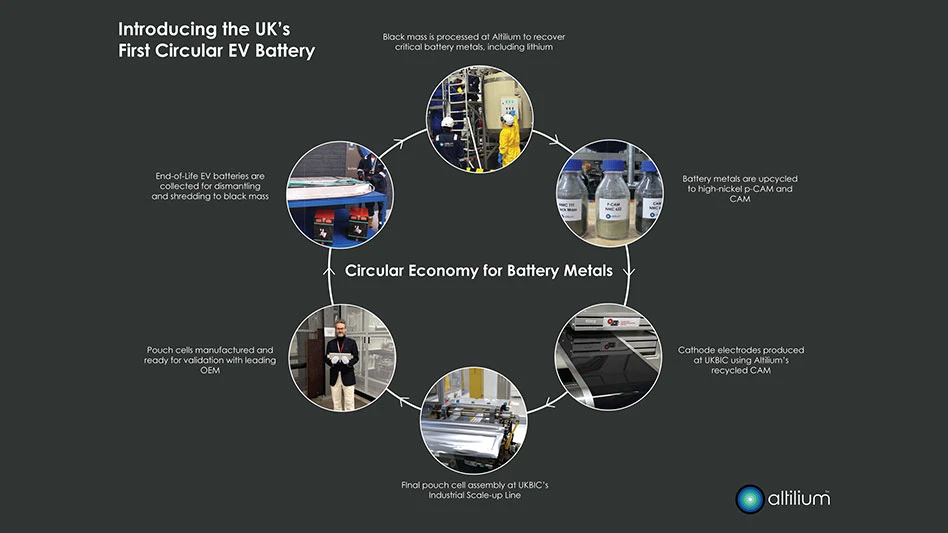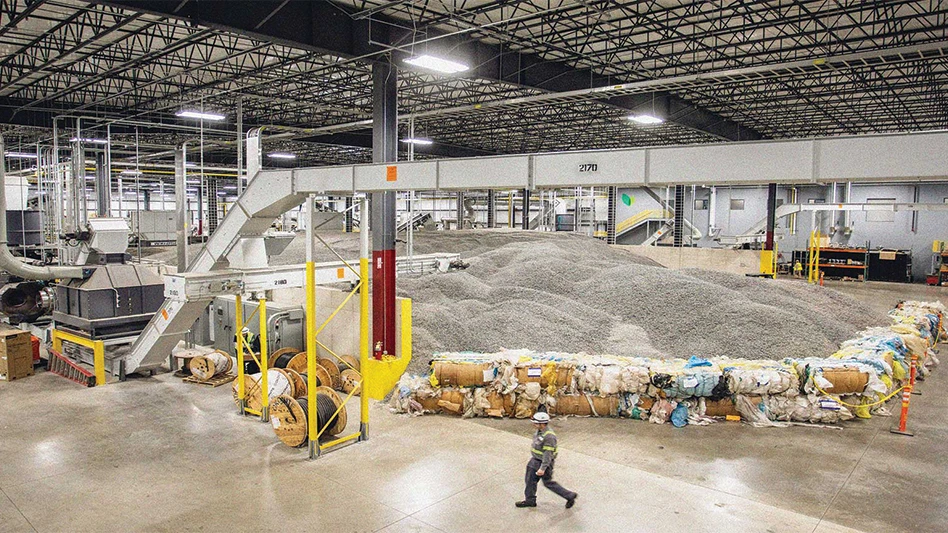Unlike much common business jargon (proprietary, state of the art, etc.), the term "best practices" is more than just an empty phrase. Ideally, the term describes an established set of guidelines that companies operating in a specific industry are expected to follow in order to produce the best product or service possible.
As the electronics recycling industry continues to mature, the associations whose members provide these services have recognized a need for such guidelines as a way to "level the playing field" in a highly fragmented industry that is made up of companies of varying sizes that offer varying levels of service.
Pete Muscanelli, president of the International Association of Electronics Recyclers (IAER), based in Albany, N.Y., says that by adopting best management practices, electronics recyclers have a "ticket to get into the game." He adds that OEMs and electronics recycling customers are still going to conduct their own due diligence audits, but adopting best management practices (BMP) helps to get a company in the running. However, because electronics recycling customers or their trade groups have not universally endorsed any such practices or available certifications—whether from the International Organization for Standardization (ISO), the IAER or the Institute of Scrap Recycling Industries (ISRI)—Muscanelli says recyclers have been slow to adopt such programs. Many are reluctant to pay for a certification that is not yet widely recognized.
Additionally, the National Association for Information Destruction (NAID) has expanded its document destruction certification program to include hard drives and electronic media, specifying that firms have a published standard physical destruction method. In the coming year, NAID will also introduce a certification program for companies that provide overwriting services, according to Executive Director Bob Johnson.
Certification aside, electronics recyclers can implement a number of measures to ensure they take a systematic approach to serving their clients that is based on responsible and sustainable practices.
"I think the first and most important aspect anyone in the electronics recycling business needs is to have good management system in place that encompasses all aspects of the electronics recycling industry, including environmental policies, procedures and health and safety programs," Muscanelli says. He adds that it is important for electronics recyclers to monitor these policies and procedures once they are in place, adjusting them as needed to facilitate constant improvement.
| Certified Operations |
|
A number of third-party certifications are available to electronics recyclers, including general quality and environmental management certifications from the International Organization of Standardization (ISO 9000 and ISO 14000), RIOS (Recycling Industry Operating Standard) certification, which the Institute of Scrap Recycling Industries (ISRI) developed for the recycling industry and certification from the International Association of Electronics Recyclers (IAER), which is specially tailored to the electronics recycling industry. Peter Muscanelli, president of the IAER, says more electronics recyclers would seek certification, which can be an expensive process, if more customers required a certification program or standard best management practices. He adds that until customers begin demanding such certifications, only the largest electronics recyclers will go through the certification process. “The majority of companies are operating in the Wild, Wild West of electronics recycling,” ISRI’s Eric Harris, director of government and international affairs for ISRI, says. He says a number of small operations within the industry have not put a priority on establishing a management system. However, among large, integrated recyclers, he says management systems are becoming a greater priority. “It absolutely helps them differentiate themselves,” Harris says, and also increases their chances of landing contracts with banks, municipalities and OEMs. Chip Slack, COO of Intechra, an electronics recycler and IT asset management firm based in Jackson, Miss., says ISO certification is often a contract requirement and helps to differentiate large electronics recyclers from smaller operations. “ISO certification ensures that we have a documented process in place and will continue to follow that process,” he says. Even when electronics recyclers have achieved certification, many customers also insist on doing their own facility audits, a practice that Intechra encourages. The company also employs internal auditors who report to Intechra’s board. |
When it comes to documentation, electronics recyclers should also be certain to use contracts that detail the extent of their services and their customers’ requirements.
GET IT IN WRITING
Contracts are necessary to virtually all business transactions, particularly those involving electronics because of the environmental and data security risks they can present.
According to Eric Harris, director of governmental and international affairs for ISRI, Washington, D.C., contracts help both parties to realize that they are in a commercial relationship. "A contract binds that relationship," he says. "A contract legally binds the downstream vendor to do what they say they are going to do."
Harris says that contracts should generally include information on product quantity and type, packaging methods and recycling specifications, as well as export criteria.
ISRI recently released a document (available at www.isri.org/electronics) that outlines suggested operating practices for electronics recyclers.
"We want to raise the tide and make these business relationships more legitimate and transparent," Harris says of ISRI’s electronics recycling operating practices dealing with contracts. "You need a legally binding, written contract with both parties acknowledging the terms that they are agreeing to."
Muscanelli also says that contracts are a "vital" tool for electronics recyclers and customers. He says they should detail the customer’s needs, a recycler’s capabilities, the items to be shipped and received and the requirements for how a recycler will need to handle the material. "Contracts should be clearly understood by both parties with no hidden traps on either side."
Chip Slack, COO of Intechra, an IT asset disposition and recycling firm based in Jackson, Miss., says contracts are important because they specify how material will be processed and provide specifics on indemnification, pricing terms, logistics and security.
While most electronics recyclers would say that indemnification against environmental damage as well as errors and omissions is definitely necessary, there is little consensus on what constitutes adequate coverage.
INDEMNIFY
While ISRI encourages electronics recyclers to carry no less than $1 million in comprehensive or commercial general liability insurance that includes coverage for property damage, bodily injury, contractual liability and complete operations, Harris says the customer is the ultimate judge of what is appropriate.
"I think you need the appropriate amount of insurance for your liability risk," Muscanelli says, adding that coverage should be customized to each electronics recycler based on the services they provide. However, he says that all recyclers should have basic coverage for general liability, logistics and environmental liability. Muscanelli suggests that recyclers work closely with their insurance agents to determine their appropriate levels of coverage.
Intechra also finds that appropriate levels of coverage vary by company. Intechra produced a white paper titled "6 Critical Requirements for IT Asset Disposition Providers" in which it states that coverage should be commensurate with the overall yearly volume of electronics a recycler handles.
LOCK DOWN
Ensuring the security of electronics as they pass from the generator to the processor is another area that merits attention, whether it’s the electronics recycler’s facility or the employees who are processing the units.
Slack says that security is addressed in some of the company’s contracts beginning with logistics. Some customers specify the use of sealed trucks, while others request an on-board guard. The company also offers data encryption services to its customers to further ensure that data will not be compromised during transit.
Intechra’s processing facilities use a variety of security measures, including metal detectors, guards and camera systems with centralized monitoring, Slack says. The company also conducts criminal background checks on prospective employees and is implementing a drug testing policy.
"The best approach to security is that you never have enough," Muscanelli says. He suggests that electronics recyclers constantly monitor and evaluate potential exposures and address vulnerabilities. "You can’t be there 24 hours a day, but you can have systems that are in place 24 hours a day."
Muscanelli also suggests that electronics recyclers contract with established security firms that understand their unique vulnerabilities.
"No one thing is going to make your facility secure when it comes to data," Muscanelli cautions. However, he says that by implementing a complete management system and monitoring it in real-time, electronics recyclers can be certain they are taking all areas of their operations into consideration and eliminating "99.9 percent" of their risk. "Security does make the difference and that’s what customers are looking for."
ISRI’s Harris also acknowledges the importance of facility security, though the association’s "Electronics Recycling Operating Practices" does not currently provide recommendations.
While these are just a few of the areas electronics recyclers should consider when looking at best practices within their industry, these measures could help to ease client concerns regarding their liability and the final fate of their end-of-life electronics as well as provide continuity to the industry.
The author is managing editor of Secure Destruction Business magazine and can be reached at dtoto@gie.net.

Explore the October 2006 Issue
Check out more from this issue and find your next story to read.
Latest from Recycling Today
- Returpack reports increased DRS activity in Sweden
- Trade groups align against European export restrictions
- Construction, auto sectors show mixed signals
- Politics in Turkey threaten recycled steel outlet
- Toppoint Holdings expands chassis fleet
- Lego creates miniature tire recycling market
- Lux Research webinar examines chemical recycling timetables
- Plastics producer tracks pulse of wire recycling market





